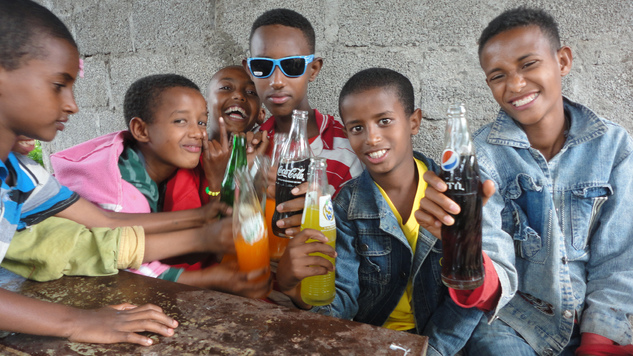
AFRICAN currencies are being hammered, and commodity-dependent economies on the continent are hurting as prices slump, but the majority of Africans believe that children growing up today will be better off financially than their parents, though it’s a slim majority, at 54%.
The most optimistic are Ethiopia and Nigeria, who express an overwhelming positive sentiment about the financial prospects of the next generation, out of nine African countries surveyed by Pew Research Global.
The survey reports that 84% of respondents from Ethiopia say that the next generation has better prospects than the current one.
It’s a reflection of the positive vibes recent economic growth has created in the country, which grew by 10.3% in 2014 – one of the fastest in the world.
Similarly, 84% of Nigerians expect a brighter future for the next generation; despite a recent dip in oil revenues and a steep currency slide, they still believe in their country’s long-term prospects – possibly due to the warm glow that Muhammadu Buhari’s recent electoral victory and the subsequent peaceful transition created. Just 11% say today’s children will have it worse.
Burkina Faso is third, with 71% upbeat about a brighter future, and Senegal fourth, at 64%.
The future is particularly important for Africa because in the next 35 years, the continent is expected to claim three of the world’s 10 most populous countries, according to projections released Tuesday by the Population Reference Bureau in Washington.
The largest of those, Nigeria, will be just 1 million people shy of the U.S.‘s size, with Democratic Republic of the Congo (DRC) and Ethiopia entering the top 10 list.
They replace Russia and Mexico, with the former’s exit leaving Europe with no country on the top 10 list.
Hopeful cases gone sour
While the U.S. and other developed countries struggle to adapt their labour forces to an aging population, African countries are experiencing a baby boom. Niger, South Sudan, DRC, Somalia and Chad have the highest fertility rates in the world.
“The population gains are also due to a decline in mortality rates due to improvements in public health,” said Peter Goldstein, vice president with the PRB, who oversaw production of its 2015 World Population Data Sheet. “Africa is going to be a key driver in population growth over the next few decades.”
Ghana (56%) and Uganda (52%) express a slightly more tempered optimism; both countries were looking promising some time ago with discoveries of significant oil deposits.
But uncontrolled government spending and fiscal mismanagement of the economy in Ghana’s case, and corruption scandals involving kickbacks on oil contracts even before a single barrel is out of the ground in Uganda’s case, has put a damper on future expectations.
The pessimists
The two countries with largely pessimistic expectations about the financial prospects of today’s children are Kenya, with 47% saying they will be worse off compared to 43% hoping for better; and Tanzania with 45% anticipating hard times, and 33% expecting better.
Such a negative outlook in these two countries is noteworthy, not only because it deviates from the generally upbeat sentiment in the rest of the African countries surveyed, but also because neither Kenya nor Tanzania has suffered any catastrophic economic or political event in the past five years that would check expectations so.
It’s likely linked to worsening perceptions of corruption, a slow, insidious “cancer” as US President Barack Obama put it during his July visit to the region, that saps investor and citizen confidence in the economy and future prospects.
Kenya and Tanzania have slipped in Transparency International’s Corruption Perceptions Index in the past three years.
Tanzania dropped seventeen places on the Index between 2012 and 2014, one of the steepest declines in Africa in recent times, while Kenya gained three places between 2012 and 2013, only to plunge nine places in the 2014 ranking.
In many countries, those aged 18 to 29 are significantly more likely than those aged 50 and older to expect today’s children to be better off financially than their parents – perhaps because the parents did not end up as successful as they thought they would be.
Young Kenyans (49%) are more likely than older ones (33%) to anticipate that the next generation will be better off. It’s a 16 percentage-point difference, the highest among African countries surveyed.
The same goes for South Africa (13-point difference), Ghana (10-point difference) and Tanzania (9-point difference).
No “Black Spring” dividend
But in Burkina Faso’s case, its curious that young people are more pessimistic than the older generation –even as the country is highly optimistic overall: 69% of young people say that the future is bright for today’s kids, compared to 79% of those aged 50 and older.
It underscores the frustration that was building in the younger generation, who took to the streets in Burkina Faso’s “Black Spring” last October, ousting long-serving President Blaise Compaore from office.
Apart from opposing Compaore’s planned extension as president, the protesters cited lack of jobs and economic opportunities as one of their main drivers to the streets.




